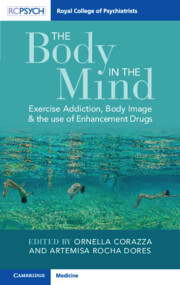Book contents
- The Body in the Mind
- The Body in the Mind
- Copyright page
- Dedication
- Contents
- Figures
- Tables
- Boxes
- Contributors
- Acknowledgements
- Introduction
- Section 1 From Exercise to Addiction: An Introduction to the Phenomenon
- Section 2 Reaching the Extreme with Exercise: A Collection of Clinical Case Studies
- Chapter 11 Being Versus Appearing: Two Sides of the Same Coin?
- Chapter 12 Reducing Excessive Exercise Behaviour Using Online Cognitive–Behavioural Therapy
- Chapter 13 The Story of My Life
- Chapter 14 Money Honey
- Section 3 Exploring the Motivations Behind Exercise Addiction
- Index
- References
Chapter 14 - Money Honey
An Interview with an ‘Informed’ Patient
from Section 2 - Reaching the Extreme with Exercise: A Collection of Clinical Case Studies
Published online by Cambridge University Press: 30 March 2023
- The Body in the Mind
- The Body in the Mind
- Copyright page
- Dedication
- Contents
- Figures
- Tables
- Boxes
- Contributors
- Acknowledgements
- Introduction
- Section 1 From Exercise to Addiction: An Introduction to the Phenomenon
- Section 2 Reaching the Extreme with Exercise: A Collection of Clinical Case Studies
- Chapter 11 Being Versus Appearing: Two Sides of the Same Coin?
- Chapter 12 Reducing Excessive Exercise Behaviour Using Online Cognitive–Behavioural Therapy
- Chapter 13 The Story of My Life
- Chapter 14 Money Honey
- Section 3 Exploring the Motivations Behind Exercise Addiction
- Index
- References
Summary
This chapter presents the transcript of an interview with a patient with narcissistic personality disorder, alcohol use disorder, and bipolar disorder, who completed a rehabilitation program (individual and group psychotherapy as well as psychopharmacological treatment). He revealed extensive use of many image- and performance-enhancing drugs (IPEDs) and fitness supplements to boost his physical performance in gym training routines. The interviewer specifically asked about the effects of these compounds on the patient’s mental state, and the ‘information’ that he gave to his clients in his capacity as personal trainer in his gyms. He had no specific expertise in the field, and the various products and combinations of supplements that he recommended were not used under medical supervision. The chapter highlights the problem of supplement and IPED consumption among gym users, the need to provide reliable information about these compounds in order to prevent psychopathological problems, and the importance of medical supervision.
Keywords
- Type
- Chapter
- Information
- The Body in the MindExercise Addiction, Body Image and the Use of Enhancement Drugs, pp. 185 - 192Publisher: Cambridge University PressPrint publication year: 2023

